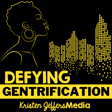
Making Plenty Good Room with Rev. Dr. Andrew Wilkes
These are times that call on a radical belief in oneself and their community. Back in October just shortly before the US Election, I interviewed Rev. Dr. Andrew Wilkes about his book Plenty Good Room, which invites the Black Church to think beyond electon cycles and go to the root of how it can be a radical force in not just American politics, but the wellbeing of all of us as Earthlings.
Yeah, timely. Unfortunately, because of the recent US Election and regime change, it took me a minute to prepare this episode for you, but it’s here now and ready. Plus, my beloved partner Les Henderson joins me for a moment of reflection on faith and will be joining me in our next few episodes.
Here’s Rev. Dr. Wilkes’s bio
Reverend Andrew Wilkes, Ph.D., is a pastor, political scientist, writer, and contemplative. He is the co-lead, co-founding pastor of the Double Love Experience Church in Brooklyn, New York, and the former Executive Director of the Drum Major Institute, a social change organization founded by Rev. Dr. Martin Luther King Jr. Dr. Wilkes is a 2022 inductee into the Martin Luther King Board of Preachers at Morehouse College and a proud alum of Hampton University, Princeton Theological Seminary, CUNY Graduate Center, and the Coro Public Affairs Fellowship. He is the author of Freedom Notes: Reflections on Faith, Justice, and the Possibility of Democracy; co-author of Psalms for Black Lives; and author of Plenty Good Room: Co-Creating an Economy of Enough for All. His writing and voice have been featured in the New York Times, Washington Post, Essence Magazine, Stanford Social Innovation Review, and Dr. Henry Louis Gates' PBS Gospel series. Dr. Wilkes is the elated husband of Rev. Dr. Gabby Cudjoe-Wilkes and lives in Brooklyn, New York.
Watch PBS's The Black Church Here
https://www.pbs.org/show/black-church/
Read my recent newsletter spelling out the seven principles of Defying Gentrification (since i forgot to put them in the episode
https://theblackurbanist.com/this-is-my-house-and-in-it-i-get-to-defy-gentrification-my-way-all-day-every-day/
Purchase from Kristen's Bookshop.org store and support the podcast! And merch and crafting classes via www.kristpattern.com
Never miss an episode, subscribe to our Substack , LinkedIn, Wordpress, or Pattreon
You can also find Kristen @blackurbanist or @kristpattern.
